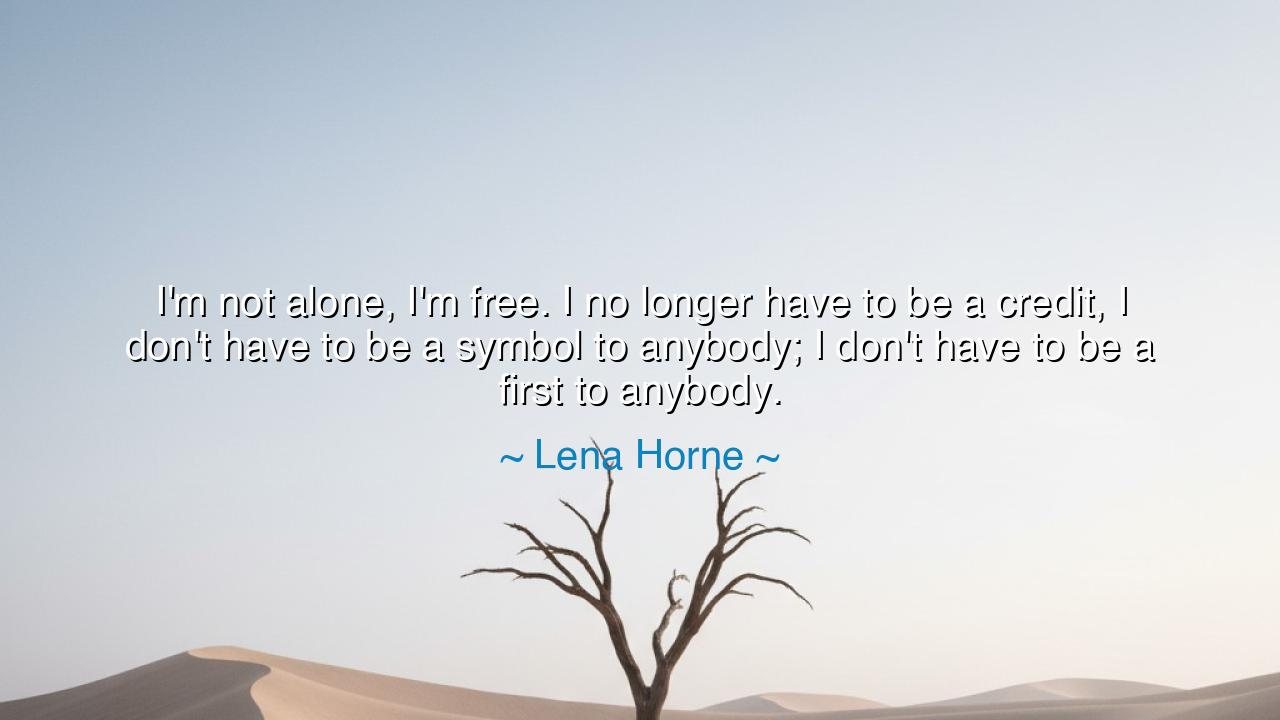
I'm not alone, I'm free. I no longer have to be a credit, I don't
I'm not alone, I'm free. I no longer have to be a credit, I don't have to be a symbol to anybody; I don't have to be a first to anybody.






"I'm not alone, I'm free. I no longer have to be a credit, I don't have to be a symbol to anybody; I don't have to be a first to anybody." These powerful words by Lena Horne speak to a profound truth about the human desire for freedom and self-identity. Horne, a woman who lived through the turmoil of racial and social expectations, was not simply speaking of physical freedom, but of a deeper, more spiritual liberation. To be free is to no longer be confined by the labels or roles that society imposes upon us. It is the ability to live on one’s own terms, unburdened by the need to fulfill the expectations of others, and to finally shed the weight of symbolism—the idea that we must be something or someone for the world to approve of us. Horne’s declaration is a call to authenticity, to living a life that is true to the self, rather than living for external recognition.
In the ancient world, the notion of freedom from societal expectations was explored by many of the philosophers. Socrates, in his famous dialogues, emphasized the importance of self-knowledge and the need to live a life free from the pressures of external judgment. He believed that true freedom came when an individual could look inward and define their purpose based on their own understanding of what is good and just, not on the opinions of others. In his death, Socrates exemplified the ultimate freedom—choosing to die rather than compromise his principles. Lena Horne, much like Socrates, sought to free herself from the expectations placed upon her, whether they were based on race, gender, or fame. By rejecting the roles that society wished her to play, she was able to live more authentically, embracing a deeper sense of personal freedom.
The ancient Stoics, such as Marcus Aurelius and Epictetus, also offered wisdom about freedom and the liberation of the soul. They taught that true freedom is found not in external circumstances but in internal mastery. Epictetus, once a slave, found freedom not by escaping physical chains, but by freeing his mind from the shackles of desire and attachment to societal expectations. His teachings emphasize that the freedom of the individual lies in the power to control one’s own responses to the world, rather than being bound by the opinions or demands of others. Horne, too, speaks to this kind of inner liberation—the freedom to no longer be a symbol, a credit, or a first to anyone but herself. She found the power to be herself, independent of the labels and roles imposed upon her.
Consider the life of Nelson Mandela, who spent 27 years in prison and emerged not just as a political leader, but as a symbol of freedom for an entire nation. Yet, even in prison, Mandela’s true sense of freedom was rooted in his ability to control his mind and his vision for a free South Africa. While physically confined, he chose to remain spiritually free, adhering to his principles and understanding that freedom is not solely about escaping external constraints but about claiming power over one’s thoughts and purpose. Mandela’s personal journey reflects Horne’s words: true freedom is not about being a symbol for others; it is about being authentically yourself, living for your own truth, not for the image others may hold of you.
Horne’s liberation from the need to be a symbol is a lesson for us all. In a world where we are often defined by the roles we play—whether as employees, parents, or public figures—it is easy to lose sight of our true selves. Like Horne, many of us may feel the weight of societal expectations pressing upon us, urging us to be something we are not or to fulfill someone else’s idea of who we should be. Yet, true freedom comes when we release these external expectations and embrace our own truth. Freedom, in this sense, is not a place or a title, but an internal state—a mindset that allows us to live in alignment with our authentic selves, regardless of what others expect or think.
The lesson in Horne’s words is one of self-empowerment. She teaches us that to be free, we must stop living for others’ approval or expectations. To be truly free, we must be willing to stand alone, to release the burden of being a symbol or fulfilling a role that does not align with our deepest values. This requires the courage to face loneliness at times, to be vulnerable, and to risk rejection in order to embrace our true selves. When we free ourselves from the need to be anything other than who we truly are, we create the space for authenticity to flourish, and in that freedom, we find the strength to live fully.
In our own lives, we should take inspiration from Horne’s assertion of independence. Let us not allow ourselves to be defined by the roles others impose upon us, whether they are shaped by family, society, or career. Instead, let us look inward and discover the truth of who we are, and then live in accordance with that truth. Just as Horne found freedom in shedding the expectations placed upon her, so too can we create lives that are true to ourselves, filled with purpose, joy, and genuine freedom. We do not need to be a symbol to anyone, and we do not need to be the first to anyone. We only need to be true to the person we were born to be, and in that authenticity, we will find the truest form of freedom.






AAdministratorAdministrator
Welcome, honored guests. Please leave a comment, we will respond soon